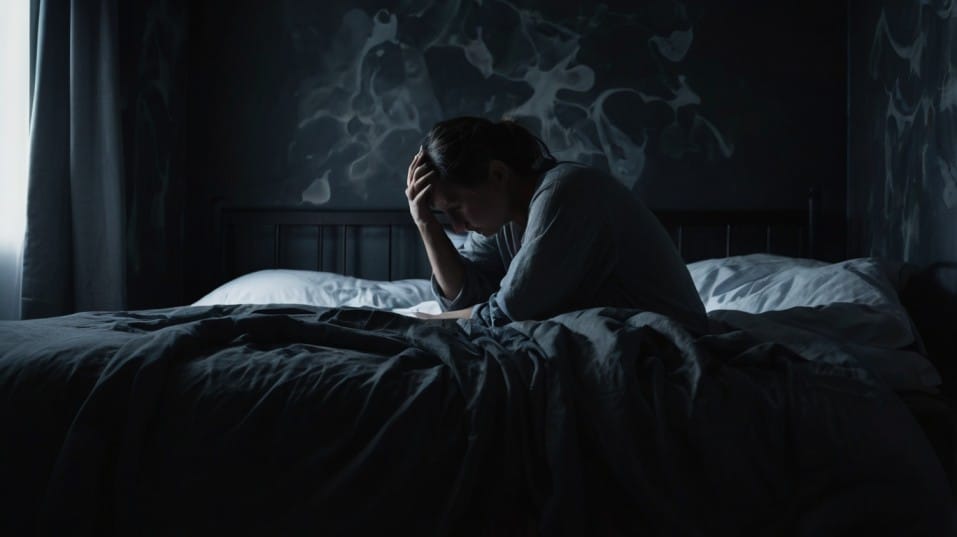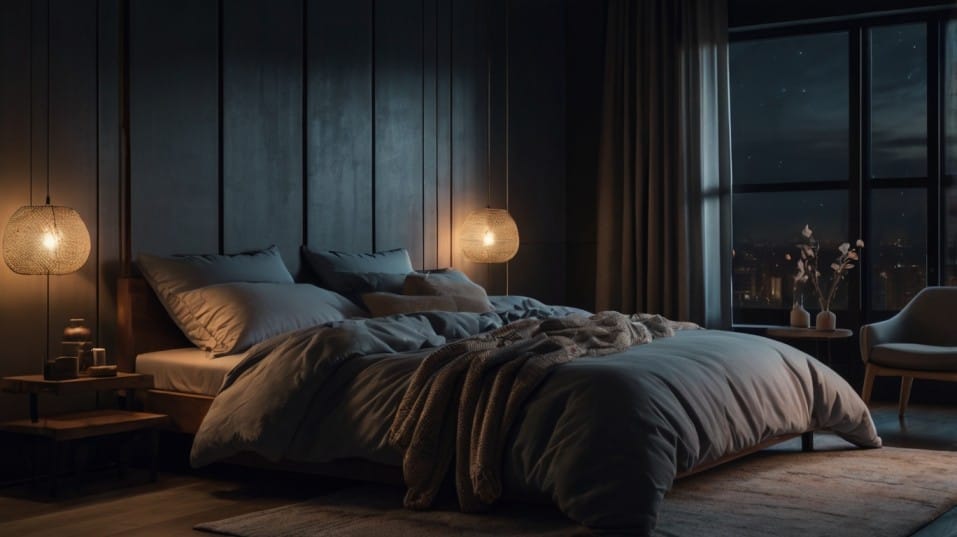Can Anxiety Be Waking You Up at Night?
Struggling with 2 AM anxiety wake-ups? Learn simple, science-backed strategies to reclaim deep sleep, boost energy, and reset your nights fast.

Ever wonder why you’re jolting awake at 2 AM, mind racing and heart pounding? It’s not random, and you’re not broken. Anxiety could be hijacking your nights—and your energy with it.
But there’s good news: sleep is a skill you can sharpen. With the right science-backed moves, you can reclaim deep, restorative rest and wake up feeling truly recharged. Let’s break the cycle and show your brain a better way to power down.
Why Anxiety Keeps You Up (Even When You’re Exhausted)
Anxiety and sleep don’t just clash—they wage war inside your nervous system.
When you’re stressed, your body releases cortisol and adrenaline, two powerful chemicals designed to keep you alert in the face of danger. Great for survival. Terrible for deep, restorative sleep.
Even when you fall asleep initially, those elevated stress hormones can jerk you awake in the middle of the night.
It’s your brain trying to stay "on guard," thinking it’s doing you a favor by snapping you back to high alert. Over time, your sleep cycle gets tangled. Your body forgets how to stay deeply asleep, and those 2–4 AM wake-ups become the new normal.
This isn’t about mental weakness. It’s about biology. If you’re stuck in a loop of stress and poor sleep, your system never gets the downtime it needs to fully reboot.
But here’s where it gets good: sleep is highly trainable. You just need the right levers.

What Happens Inside Your Brain When Anxiety Strikes at Night
Sleep isn’t just "rest." It’s an orchestrated dance between different brain states—specifically, between non-REM deep sleep and REM dream sleep. Anxiety disrupts this cycle in two big ways:
- It delays deep sleep onset, making you hover in lighter sleep stages where it’s easier to wake up.
- It fragments REM sleep, cutting short the emotional processing that normally helps you feel calmer and more resilient the next day.
Waking up anxious is often a side effect of unfinished emotional processing. Your brain is basically hitting pause at night because it thinks there's "unfinished business" to sort out.
The more fragmented your sleep, the less emotional resilience you build, and the more vulnerable you become to nighttime anxiety loops. It's a vicious cycle—but it can absolutely be broken.
How to Break the Anxiety–Sleep Disruption Cycle
Fighting your wake-ups will backfire. Lying in bed getting frustrated only conditions your brain to link your bed with stress. Instead, use these tactical shifts that directly counter anxiety’s grip without needing a 47-step bedtime routine.
Reset the Association Between Bed and Anxiety
If you wake up and feel anxious, don't stay in bed marinating in it. Quietly get up and leave the room if possible. Keep lights dim.
Do something low-stimulus like flipping through a boring magazine, stretching, or sitting quietly. No screens. No checking the clock. No mental negotiations.
When you start feeling sleepy again, return to bed. This retrains your brain: bed equals sleep, not stress.
Build a Wind-Down That Actually Works
Real wind-downs aren’t bubble baths and face masks (unless you love them). They're about signaling to your nervous system: “It’s safe to power down.”
Start at least 90 minutes before bed:
- Dim the lights. Light exposure after dark delays melatonin release.
- Cut stimulating input. No work emails, no doomscrolling, no intense shows.
- Move your body gently. Stretching, foam rolling, or even just slow pacing can help burn off residual tension.
- Cue relaxation deliberately. Breathwork, low-key journaling, or simply lying still and listening to calm music works.
Think of it as removing obstacles rather than adding tasks. You're creating conditions for sleep, not forcing sleep to happen.
Discharge the Mental Clutter
A cluttered mind has no business trying to power down cold. One of the most powerful hacks? Pre-bed journaling.
Not an emotional dump. Not a deep diary session. Just a simple "brain dump"—a bullet list of tomorrow’s tasks, concerns, or random thoughts.
Research from Baylor University shows that people who wrote detailed to-do lists before bed fell asleep significantly faster than those who journaled about completed tasks. Your brain wants permission to let go. Give it an easy exit ramp.
Tactical Tweaks to Reinforce Better Sleep
Layer these moves into your daily rhythm to make anxiety-fueled wake-ups less likely before they even start.
Lock in a Morning Wake Time (and Stick to It)
Your circadian rhythm craves consistency. Getting up at a different time every day trains your brain to expect chaos. Even if you had a rough night, resist the urge to "sleep in" to compensate. It just adds more jetlag to your internal clock.
Choose a realistic wake time you can stick to seven days a week. Your body will start to anticipate sleep naturally—without the drama.
Build a "Light Discipline" Routine
Light is the strongest regulator of your body clock. Blast yourself with bright, natural light within 30 minutes of waking. It sharpens alertness, suppresses lingering melatonin, and locks in your biological "daytime" signal.
At night, flip the script: use dim, warm light after sunset. No overheads. No glaring screens. Light management alone can radically shift sleep quality in a week.
Control Your Sleep Environment Like a Pro
Your bedroom should feel like a sensory deprivation chamber designed for recovery.
- Cool it down. 65°F (18°C) is the sweet spot for most people.
- Block light completely. Blackout curtains. Sleep mask if needed.
- Kill noise. White noise machines, earplugs, or even an app can block disruptive sounds.
- Clear clutter. A messy, overstimulating room fuels subconscious tension.
Make your bedroom so boring your brain has no choice but to fall asleep.
Rethink Afternoon Caffeine
Caffeine lingers in your system far longer than you feel it. Its half-life (the time for your body to eliminate half the amount you consumed) is around 5–7 hours. That espresso at 3 PM? It's still partially active at 10 PM.
A hard cutoff by noon works best for truly effortless sleep. If you’re dragging in the afternoon, lean on movement (quick walks, sunlight, even cold water splashes) instead of more stimulants.
Final Thoughts: Reclaiming Your Sleep From Anxiety
Anxiety doesn’t get to own your nights. Not if you take the right approach. Wake-ups aren’t random—they’re your brain calling for a new rhythm.
The fastest way to start sleeping better is to stop hoping for perfect conditions and start creating them.
Disrupt the anxiety–sleep sabotage loop with real moves: control your environment, stabilize your wake times, dial down the nighttime stimulation, and create an effortless off-ramp for your brain at night.
Start now. Pick one strategy from today’s playbook—maybe a hard caffeine cutoff, a strict wake time, or a real wind-down routine—and put it into practice tonight.
Build from there. Your energy, focus, recovery, and overall resilience will thank you for it.




